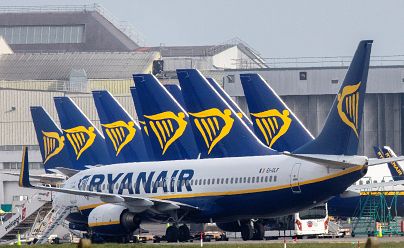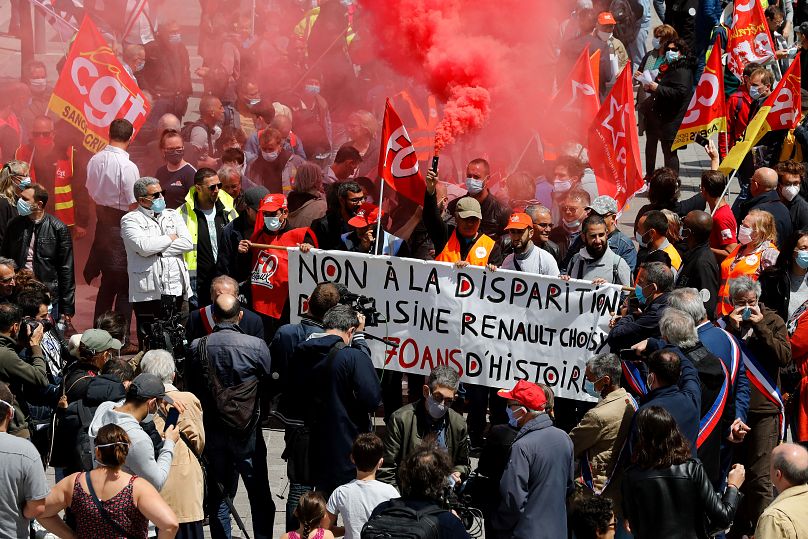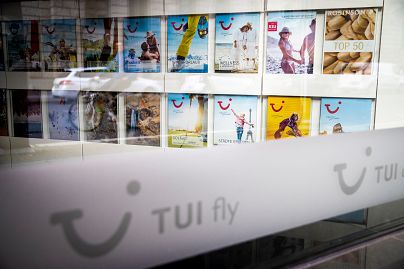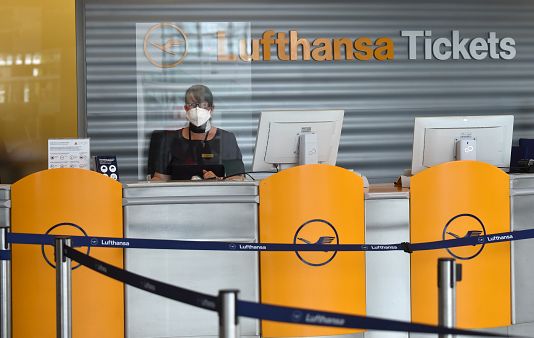About 397,000 people in the European Union lost their jobs in April, according to data from the EU's stats agency,
Unemployment across Europe has risen due to the coronavirus pandemic with airline companies and the automobile sector making some of the biggest job cuts in recent months.
The number of unemployed people in the European Union increased by 336,000 in July, according to data from the bloc's statistics agency. This compares to a rise in the number of jobless of 281,000 in June, 253,000 in May and 397,000 in April.
The EU’s jobless rate had thus ticked up to 7.2% in July according to Eurostat -- up from 7.1% in June, and from a 12-year-low of 6.4% in March.
The euro area — which comprises 19 countries with the common currency — is harder-hit with a seasonally-adjusted jobless rate of 7.9% in July, up from 7.8% in June.
Eurostat quarterly figures published in August showed the number of people in work fell by 2.6% in the EU (2.8% in the euro area) in the second quarter of 2020, the sharpest decline since records began in 1995.
While furlough schemes (putting workers on temporary leave and the government paying a percentage of their salaries) across Europe are helping some shield from the economic impact of COVID-19, others are less fortunate.
Here is our updated list of companies in some European countries making job cuts either due to — or in part because of — COVID-19.
United Kingdom
Marks and Spencer (7,000 jobs)
In response to the "substantial uncertainty about market conditions and the duration of [COVID-19] social distancing measures," Marks and Spencer unveiled proposals on August 18 that would ax 7,000 jobs.
The British retailer said the job cuts — which will impact central and regional management, as well as store staff — would be carried out over the next three months. It added however that a number of new jobs will be created in online fulfilment.
"In May we outlined our plans to learn from the crisis, accelerate our transformation and deliver a stronger, more agile business in a world in which customer habits were changed forever," Chief Executive Steve Rowe said in a statement.
"These proposals are an important step in becoming a leaner, faster business set up to serve changing customer needs and we are committed to supporting colleagues through this time," he added.
British Petroleum (10,000 jobs)
British oil giant BP announced plans to cut 10,000 jobs on June 8 due to the coronavirus crisis, which has slashed global demand for oil and in turn its prices.
In a company-wide email seen by Euronews, CEO Bernard Looney confirmed the job cuts, saying that most would be made this year.
He said: “We will now begin a process that will see close to 10,000 people leaving BP – most by the end of this year."
Though the email did not specify where the redundancies would take place, it said: “The majority of people affected will be in office-based jobs. We are protecting the frontline of the company and, as always, prioritising safe and reliable operations.”
Centrica (5,000 jobs)
The energy company announced in June a "significant restructure" of its business model "designed to create a simpler, leaner Group".
The cost-saving measure should lead to a reduction of around 5,000 roles, half of which will come from management layers. The majority of the restructuring is to take place in the second half of 2020.
"I truly regret that these difficult decisions will have to be made and understand the impact on the colleagues who will leave us," Centrica CEO Chris O'Shea said in a statement.
"However, these changes we are proposing to make are designed to arrest our decline, allow us to focus on our customers and create a sustainable company," he added.
Ovo Energy (2,600 jobs)
Britain's second-largest energy supplier is to slash 2,600 jobs, "largely through voluntary redundancy over the course of 2020," it said in a statement.
The announcement, in May, came just four months after it acquired SSE Energy Service for £500 million (€555 million).
"Since the acquisition of SSE Energy Services, OVO has been planning the integration of the two businesses which would have always required changes," the company said.
"The impact of COVID-19 has now accelerated changing consumer behaviour with more and more customers going online and using digital tools. This has permanently reduced the demand for some functions and roles," it added.
Rolls Royce (9,000 jobs)
The UK-based jet engine maker said that the pandemic's impact on the aviation industry had forced the company into "difficult decisions to see our business through these unprecedented times."
Over a sixth of the company's 52,000 strong global workforce is to be cut as part of its "major reorganisation".
According to the Unite, 3,375 UK staff will lose their jobs. The union described the announcement as "shameful opportunism".
"This company has accepted public money to furlough thousands of workers. Unite and Britain’s taxpayers deserve a more responsible approach to a national emergency. We call upon Rolls Royce to step back from the brink and work with us on a better way through this crisis," Unite assistant general secretary for manufacturing Steve Turner said.
Pret A Manger (2,800 jobs)
Heavily-impacted by COVID-19 in terms of "cash flow" and "operating costs," the sandwich shop chain said in a statement seen by Euronews that it will close 30 outlets across the country, almost half of them in London.
Pret subsequently announced in August that it planned to cut about 2,800 jobs after sales fell 60%. The company employs around 8,000 people in the UK.
“When the coronavirus crisis hit, we said that our priority was to protect our people, our customers, and, of course, Pret. We confirmed it was our intention to do everything we could to save jobs," said Pret’s CEO, Pano Christou.
“Although we were able to do that through the lockdown, thanks in particular to the government’s vital support, we cannot defy gravity and continue with the business model we had before the pandemic. That is why we have adapted our business and found new ways to reach our customers."
Costa Coffee (1,650 jobs at risk)
The coffee chain has reopened most of its 2,700 stores in the UK since the lockdown, however on September 3 it announced that 1,650 jobs were at risk as the result of an enforced restructuring, from its 16,000-strong workforce.
Mulberry (25 per cent of its workforce)
Even luxury fashion cannot catch a break from coronavirus. Mulberry, the UK brand known for its leather goods and costly handbags, said on Monday it would cut 25 per cent of its worldwide workforce.
It's expected most of the jobs will go in the UK, where the vast majority of its staff works.
Casual Dining Group - Bella Italia, Café Rouge, Las Iguanas (1,900 jobs)
The restaurant chain owner has fallen into administration, announcing an immediate loss of 1,900 of its workforce.
According to reports, a number of buyers are said to be interested in the separate chains, but they are not keen to take over all the 250 outlets.
Therefore, at least 91 restaurants will remain closed.
Swissport (4,556 jobs)
Aviation services company Swissport said it could cut 4,556 jobs in the UK and Ireland, becoming the latest victim of the coronavirus pandemic as it continues to wreak havoc on the airline industry.
Swissport Western Europe, which operates at London airports Heathrow and Gatwick, said in a statement that it had to reduce its staff size to survive the crisis.
The company, which hires more than 64,000 people globally, told Euronews it was inevitable staff in Europe will also be made redundant — but did not say how many jobs were at risk.
British Airways (up to 12,000 jobs)
British Airways announced at the end of April it would cut up to 12,000 jobs from its 42,000-strong workforce due to coronavirus' devastating impact on the travel industry.
The airline's parent company, International Airlines Group (IAG), said it needed to impose a "restructuring and redundancy programme" until the demand for air travel returns to pre-coronavirus levels.
Job losses could also occur at IAG’s other airlines, Iberia and Vueling in Spain and Ireland’s Aer Lingus, CEO Willie Walsh has warned.
EasyJet (around 4,500 jobs)
Britain's low-cost airline EasyJet has also announced it would be cutting jobs in the wake of coronavirus.
The company said 30 per cent of its workforce would be slashed, which amounts to about 4,500 jobs.
At the end of June, EasyJet said it was also considering closing three of its bases in the UK.
Virgin Atlantic (3,000 jobs)
The airline has announced it will cut more than 3,000 jobs in the UK and end its operations at Gatwick Airport.
Reach plc (550 jobs)
The UK's largest national and regional news publisher - which also owns the Daily Express and Daily Mirror newspapers - announced on July 7 that it is slashing 12 per cent of its workforce.
"Structural change in the media sector has accelerated during the pandemic," the group's CEO Jim Mullen said, adding that "to meet these challenges and to accelerate our customer value strategy, we have completed plans to transform the business."
"Regrettably, these plans involve a reduction in our workforce."
Boots (4,000 jobs)
UK retailer Boots, known for its pharmacies, beauty retail and opticians will cut 4,000 jobs or about 7 per cent of its workforce.
It is closing 48 Boots Opticians stores and will have a 20 per cent reduction in the UK support office, parent company Walgreens Boots Alliance said in a statement.
Although Boots' Pharmacies remained open during lockdown, the company said that "footfall into the stores dramatically reduced."
"We recognise that today’s proposals will be very difficult for the remarkable people who make up the heart of our business, and we will do everything in our power to provide the fullest support during this time," said Boots UK managing director Sebastian James.
John Lewis (1,300 jobs)
John Lewis will close eight stores with a potential 1,300 job cuts, the company said in a statement.
The stores that will close are in Birmingham, Croydon, Heathrow, Newbury, St Pancras, Swindon, Tamworth and Watford.
"Our priority now is the wellbeing and future of the Partners affected, and if job losses are confirmed, we will explore opportunities for anyone who wishes to stay in the John Lewis Partnership," partner and executive director Bérangère Michel said in a statement.
Ireland
Ryanair (about 3,000 jobs)
Budget airline Ryanair said it would cut 15 per cent of its workforce globally - about 3,000 jobs - after the pandemic grounded flights.
Chief executive, Michael O’Leary said the measures are "the minimum that we need just to survive the next 12 months."
O'Leary took a 50 per cent pay cut for April and May and has now extended it until the end of March next year.
France
Renault (15,000 jobs)
French automobile maker Renault announced at the end of May it would axe 15,000 jobs worldwide as it tries to ride out the drop in car sales, which have plummeted even further due to coronavirus.
4,600 of those jobs would be cut in France. However, that figure may be lower since Renault secured a government loan of €5 billion and would in exchange restructure its factories.
French President Emmanuel Macron told employees at two Renault factories their future was guaranteed.
Renault, which is partly owned by the French government, was under pressure even before COVID-19 hit and posted its first loss in a decade last year. It is also trying to ride out the spectre of Carlos Ghosn.
The job cuts come as part of its plans to find €2 billion in savings over the next three years.
Airbus (15,000 jobs)
Airbus said on June 30 it is to cut 15,000 jobs as it faces “the gravest crisis this sector has ever experienced”. This represents a 1% reduction in the company's workforce worldwide.
This makes the outlook worse for the European planemaker, which said in May it could cut up to 10,000 jobs amid the coronavirus travel slump.
Around 5,100 jobs will be cut in Germany, 5,000 in France, 1,700 in the United Kingdom, 900 in Spain and 1,300 at the group's other sites around the world.
Airbus said in April it would cut the number of planes it built by a third as airlines cancelled or delayed orders as flights have been grounded.
Air France
Air France says it will be cutting 7,500 jobs from workforce by 2022. This includes 6,500 job cuts from Air France itself, while a further 1,000 will be lost at regional subsidiary Hop.
According to the French flagship carrier, the majority of the cuts are hoped to be made by not replacing resigning and retiring workers.
It said it would also be encouraging voluntary resignations and resignations before redundancies are eventually brought into play.
Eurolines (compulsory liquidation)
A French court has placed long-distance coach company Eurolines into compulsory liquidation, with the French transport giant stopping operations after 35 years.
It came after Eurolines was bought out by German group FlixBus last year, but unions have claimed the holding company refused to look for a buyer and is taking advantage of the coronavirus pandemic to axe jobs.
The decision concerns 36 people still employed by Eurolines, with over 50 redeployed in an employment preservation plan.
When asked by Euronews, Eurolines' management said the insolvency proceedings were "inevitable due to the financial situation in which the company finds itself".
It added the firm's financial difficulties were "suddenly and strongly aggravated by the health and economic crisis caused by the COVID-19 pandemic, which has hit all road passenger transport and caused an unprecedented global drop in demand."
But unions have claimed the holding company refused to look for a buyer and is taking advantage of the coronavirus pandemic to axe jobs.
"Flixbus has emptied Eurolines of its substance, is going to regain market share and is now trying to get rid of the employees without paying anything," Pierre-François Rousseau, a lawyer representing Eurolines employees, told AFP
Germany
Tui (8,000 jobs)
Anglo-German travel firm Tui announced on May 13 it would cut 8,000 jobs worldwide.
In a half-year financial report, it said the pandemic was “unquestionably the greatest crisis the tourism industry and Tui has ever faced.”
In March, Tui was granted a loan of €1.8 billion by the German government to help see it through the pandemic.
Thyssenkrupp (3,000 jobs)
Industrial conglomerate Thyssenkrupp announced on March 25 it would cut 3,000 jobs in its steel unit in Germany as part of a COVID-19 "crisis package".
The group, which makes elevators and submarines, said it had reached a deal with Germany’s powerful IG Metall union to cut 2,000 jobs over the next three years and another 1,000 by 2026.
MTU Aero Engines (1,000-1,500 jobs)
The German aircraft engine manufacturer announced on July 6 it aims to cut its workforce by 10-15% by the end of 2021 in its German and international plants through "increased use of flexible measures" and partial retirement or early retirement agreements.
Lufthansa (22,000 jobs)
German airline Lufthansa said on June 11 it would cut 22,000 jobs due to travel disruptions caused by the coronavirus. The airline said half the job cuts would be in Germany.
Spain
Nissan (2,800 jobs)
The Japanese carmaker announced on May 28 that it would close its factory in Barcelona, which employs around 2,800 people.
Protests erupted with people burning tyres to try and fight for their jobs.
The firm said coronavirus had piled pressure on the company and that it would focus on its markets in Asia and North America.
Switzerland
Schindler (2,000 jobs)
The company, which manufactures escalators, moving walkways, and elevators worldwide, announced on July 24 that due to the impact of COVID-19, and "to preserve its competitiveness", is going to cut 2,000 jobs globally.
It follows a reported 12.1% contraction in "order intake in the first half of 2020".
Scandinavia
Scandinavia Airlines (5,000 jobs)
While Scandinavia Airlines (SAS) also announced temporary job cuts in March, a month later it said 5,000 jobs—almost half the total number of employees—will lose their jobs permanently.
The company, part-owned by Sweden and Denmark, said that the potential reduction of the workforce would be split with approximately 1,900 positions in Sweden, 1,300 in Norway and 1,700 in Denmark.

















